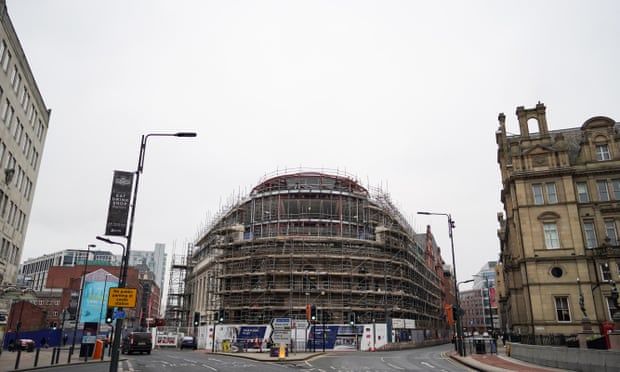
Channel 4 opens new HQ in Leeds as it fights against privatisation
Channel 4 will open its national headquarters in Leeds on Monday as it fights against a government threatening to sell it off to the highest bidder.
About 200 of the channel’s 912 staff will initially work out of the former Majestyk nightclub, in a move that has been three years in the making after Leeds beat off competition from Birmingham and Manchester.
Alex Mahon, the broadcaster’s chief executive, remains London-based, along with her key lieutenants, including the chief content officer, Ian Katz. She insists they will spend plenty of time in Leeds, as well as Channel 4’s other new hubs in Glasgow and Bristol.
Caroline Hollick, the head of drama, will be based in Leeds, as will the head of sport, Pete Andrews. A number of commissioners will also be there, along with the 49-strong 4Studio team, the channel’s in-house digital content studio.
Though Leeds claimed victory when Channel 4 eventually gave it the nod back in 2018, it was Bradford, 10 miles up the road, that clinched it, according to Tom Riordan, the chief executive of Leeds city council.
After years of sniping at each other (Leeds takes all the money and the glory and looks down on us, moaned Bradford), the cities have reached a sort of Yorkshire entente cordiale. “We couldn’t have won it without Bradford, and Bradford couldn’t have won it without Leeds,” said Riordan. Mahon agrees, saying Bradford was “particularly interesting to us because of ethnic diversity and social mobility and because of the youth of the city”.
Kersten England, Bradford’s chief executive, said Channel 4 wanted to recruit and work in the city “to live up to their brand and aspiration, which is to cover Britain as it is … in their workforce, in whom they commission from, in the places they feature. They are still largely white and Oxbridge-educated. They are aware of that. They are self critical. They want to do something about it.”
The relocation comes at a difficult time for Channel 4, with the government consulting on its future with a document that strongly argues the case for it to be sold off.
 Construction work at the former Majestyk nightclub building, the site of Channel 4’s new Leeds office.
Construction work at the former Majestyk nightclub building, the site of Channel 4’s new Leeds office.
The relocation was forced by the Conservative government in the aftermath of the Brexit vote, amid much handwringing about how Britain’s state-owned broadcasters had lost touch with the nation outside London.
Then as now, the government really wanted to privatise Channel 4, but settled instead for forcing what it views as its most petulant state-owned asset out of the capital.
John Whittingdale, the culture minister and former culture secretary who has long wanted to privatise Channel 4, said he persuaded Mahon to accept a move out of London over drinks at the Garrick club in 2017 shortly after she became chief executive.
“I kept saying to Alex: look, if you embrace this and make a positive thing of it, not only will the government be happy but this could be the making of you as the new chief exec of Channel 4 because it so fits in with what C4 is meant to be there to do. Yeah, some people who like living in London and dining in Soho might not be happy but you will be a hero to the rest of the country and obviously in the city you choose to go to,” he said.
Mahon’s predecessor, David Abraham, had vehemently opposed any move out of London. It would “destroy” Channel 4 to be forced to Birmingham (the original hot favourite), he told the FT as he served his notice period in 2016. He warned MPs that between 60% and 80% of its staff would leave the organisation rather than move, as the BBC had discovered during its own reluctant relocation to Salford.
Up to 90% of the 300 Channel 4 staff told their jobs were moving to Leeds, Bristol or Glasgow chose to take redundancy, a spokesperson confirmed, equating to up to 270 departures.
“Our commitment to moving roles out of London inevitably meant that for personal reasons some people chose not to relocate. However, this has given us the opportunity to recruit people locally, bringing with them different perspectives and talent into the organisation,” he said, adding that since the pandemic 20 London staffers have asked to move to Leeds.
Channel 4 News, which is made by ITN, had promised to set up a studio in Leeds from which presenters would anchor the show several times a week. In January 2019 the programme’s editor, Ben de Pear, said at least 20 of Channel 4 News’s 120 staff would be based in Leeds, including three on-air correspondents, but none have yet been hired. Job adverts for some roles appeared in March 2020 but recruitment was put on hold because of the pandemic. The Leeds studio does not yet exist.
Mahon argues that having staffers based in Leeds is less important than where its programmes are made. Channel 4 does not make any of its own shows but commissions them from independent production companies.
In 2019 Mahon pledged to spend half of Channel 4’s total £700m annual programme budget on shows made by TV production companies based outside London by 2023, up from £169m. Last year the proportion had shot up to 47%.










